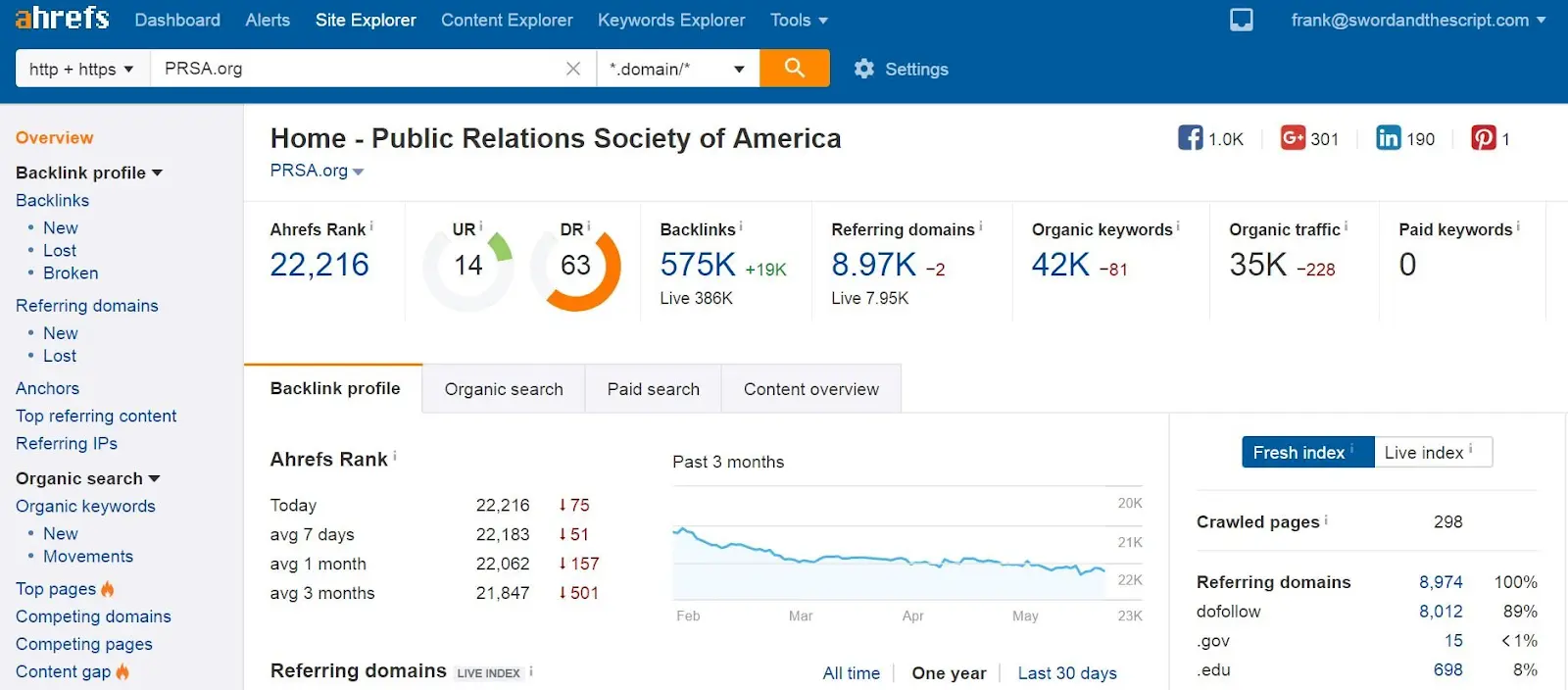
Choosing the Right Keywords Rich Domains Tool: Top Picks and Features
Greetings, digital navigators! Today, we embark on a quest to unravel the mysteries of choosing the right keywords for your domain – the digital compass that guides your online presence. In a world saturated with information, finding the right keywords is like discovering a treasure map. Fear not! We'll navigate this terrain together, exploring the top picks and features of Keywords Rich Domains tools to set you on the path to digital mastery.
Unlocking the Power of Keywords in Domains
Let's kick things off by understanding the significance of keywords in domains. It's not just about having a catchy name; it's about strategically embedding keywords that resonate with your audience and tell search engines exactly what your website is all about. Think of it as a neon sign that attracts both users and algorithms.
The Role of Keywords Rich Domains Tools

Now, you might be wondering – what's the deal with Keywords Rich Domains tools? These tools are your trusty sidekicks in the journey of domain selection. They analyze the digital landscape, suggesting domain names that not only align with your content but also give you an edge in the SEO game. It's like having a personal advisor in the realm of digital real estate.
Yoast SEO: The Content Maestro: For WordPress enthusiasts, Yoast SEO is the undisputed champion. While primarily known for its content analysis prowess, it extends its reach to domain suggestions. It's like having a content maestro who not only polishes your articles but also guides you in choosing a domain that harmonizes using Keywords Rich Domains tools.
SEMrush: The All-in-One SEO Arsenal: In the SEO battlefield, SEMrush stands tall as an all-in-one arsenal. Its domain analysis tools provide valuable insights into keyword-rich domain options. Think of it as a Swiss Army knife, not just for SEO, but for sculpting a domain that stands out in the vast online landscape using Keywords Rich Domains tools.
Explore More: The Ultimate Guide to Converting Word Documents to PDF | Word to PDF Conversion Tips: Ensuring Quality and Compatibility
Ahrefs: Unleashing Domain Potential

Ahrefs is not just about backlinks and rankings; it's also your secret weapon in the domain game. Its robust tools dissect the digital realm, offering domain suggestions that are not only keyword-rich but also strategically sound. It's like having a digital architect craft the blueprint for your online empire with the help of Keywords Rich Domains tools.
Google Keyword Planner: The Alphabet's Gift : When Google speaks, we listen. Google Keyword Planner, though designed for ad campaigns, provides invaluable insights into keyword popularity. It's like having a sneak peek into the preferences of the most significant player in the digital arena, helping you align your domain with user intent.
BeBran Keyword Rich Domain: If you're in the market for a tool that blends creativity with keyword optimization, BeBran Keyword Rich Domain Finder Tool, is your go-to. It generates domain suggestions by combining keywords, creating a symphony of options. It's like a brainstorming session with a creative team, resulting in a domain that's both catchy and strategic usage Keywords Rich Domains tools.
KWFinder: Your Keyword Treasure Map

In the quest for the perfect domain, KWFinder acts as your treasure map. Beyond its keyword research capabilities, it offers insights into domain availability and competitiveness. It's like having a guide leading you through uncharted territories, revealing hidden gems in the form of keyword-rich domains with the assistance of Keywords Rich Domains tools.
Moz: Domain Authority Unleashed : Moz, known for its Domain Authority metric, steps into the domain suggestion arena with finesse. Its tools analyze the SEO landscape, recommending domains that not only fit your content but also boost your authority. It's like having a backstage pass to the SEO concert, ensuring your domain takes center stage with the guidance of Keywords Rich Domains tools.
LeanDomainSearch: Simplicity with Impact: For those who appreciate simplicity with a punch, LeanDomainSearch is a breath of fresh air. It combines your keyword with various prefixes and suffixes, generating a list of available domains. It's like having a minimalist artist sketching the perfect outline for your digital canvas.
Conclusion: Sailing the Seas of Digital Success
As we sail through the seas of digital success, remember that choosing the right keywords for your domain is not a one-time affair but an ongoing journey. The tools mentioned here are your companions in this expedition, offering insights and suggestions to elevate your digital presence. So, embark on this adventure, explore the possibilities, and let the right keywords guide your ship to the shores of online triumph. May your domain be both a beacon and a treasure chest in the vast digital ocean with the help of Keywords Rich Domains tools!
Also Read: Keyword Research for Domain Names: Finding the Perfect Match | Avoiding Keyword Stuffing: Best Practices for Using Keyword-Rich Domains
Frequently Asked Questions:
Q1. What are rich domains?
Rich domains refer to web addresses that contain valuable and relevant keywords related to the content or purpose of the website. These domains often provide a clear indication of what users can expect when visiting the site.
Q2. What are valuable keywords for domain names?
Valuable keywords for domain names are terms or phrases that directly relate to the content or theme of a website. Choosing keywords that are relevant to your niche can enhance the visibility and search engine ranking of your site.
Q3. Which domains are best for SEO?
Domains that include relevant keywords and are easy to remember tend to be best for SEO. Consider using top-level domains like .com, .org, or country-specific domains for a broader reach and better search engine recognition.
Q4. What are domain keywords?
Domain keywords are the words or phrases included in a website's URL that represent the content or focus of the site. These keywords play a role in search engine optimization, helping users and search engines understand the nature of the website.
Q5. What are the 3 types of domain names?
The three types of domain names are top-level domains (TLDs), second-level domains (SLDs), and subdomains. TLDs are the highest level, like .com or .org, followed by SLDs, which are the main part of the domain, and subdomains, which come before the main domain.
Q6. Which domain is best for ranking?
The .com domain is often considered the best for ranking as it is widely recognized and tends to be more trusted by users. However, other TLDs like .org or .net can also be effective depending on the nature of the website.
Q7. What are the top 3 domains?
The top three domains, in terms of popularity and recognition, are .com, .org, and .net. These domains are widely used and trusted by users, making them popular choices for websites.
Q8. What are domains in SEO?
In SEO, domains refer to web addresses or URLs. Choosing a domain that includes relevant keywords, is easy to remember, and has a clear connection to the website's content can positively impact its search engine optimization.
Q9. What are the 10 top-level domains?
The 10 top-level domains include .com, .org, .net, .gov, .edu, .mil, .int, .eu, .aero, and .coop. Each serves a specific purpose or is associated with a particular type of organization.
Q10. Which domain is trending?
The trending domain can vary based on current events and industry trends. Keeping an eye on emerging TLDs or those gaining popularity in your specific niche can help you choose a domain that aligns with current trends.
Q11. Are there 4 domains?
While there are numerous domain extensions available, the most common divisions are top-level domains (TLDs), second-level domains (SLDs), and subdomains. These three categories encompass the majority of web addresses.
Q12. What is the domain type?
The domain type refers to the category or classification of a web address. Common types include top-level domains (TLDs), second-level domains (SLDs), and subdomains. Each serves a distinct purpose in organizing and structuring web addresses.



